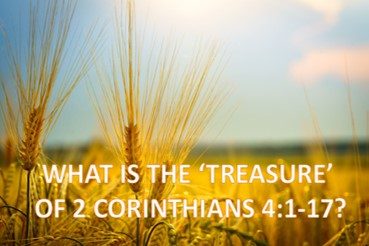
Introduction
‘Therefore, since through God’s mercy we have this ministry, we do not lose heart.’ 2 Corinthians 4:1
‘Therefore’ always refers to something already written and should prompt us to ask wherefore? I.e. why?
In the previous chapter, Paul explained that the fading ‘glow’ of the face of Moses symbolically predicted that the glory of the Old Covenant would pass away, and was destined to be replaced by a New Covenant the glory of which would never pass away. He adds that Moses was aware of this, and covered his face so that the people might not see it. 2 Corinthians 3:7-18.
But, to whom does he refer to in 2 Corinthians 4:2-17? Notice the frequent use of the words ‘we’, ‘our’ ‘us’, and ‘ourselves’. These words are personal pronouns, grammatically they are ‘first person, singular- number, present tense’ and they occur 23 times in the 18 verses of this chapter. 2 Corinthians 4:5 / 2 Corinthians 4:12 / 2 Corinthians 4:14.
Notice now, the words ‘your’, and ‘you’. These are also personal pronouns. Notice the expressions in verse 5, ‘For what we preach is not ourselves, but Jesus Christ as Lord, and ourselves as your servants for Jesus’ sake’. See also 2 Corinthians 4:12 / 2 Corinthians 4:14.
Who are the ‘us’ and ‘you’? And, why does he make this distinction?
A correct answer to this question will reveal to whom Paul refers in verse 17, which is a frequently misunderstood verse.
‘For we have this treasure in earthen vessel that the excellence of the power may be of God and not of us’. 2 Corinthians 4:7
What is the ‘treasure’ to which he refers?
The first verse takes us back again to the discussion of his personal Ministry. 2 Corinthians 3:3-10. The words, ‘ministry’, ‘minister’ and ‘ministrations’ occur 6 times in verses 3-10 and in verse 6 we have the definitive phrase ‘ministers of the new covenant’.
We recall that the subject of Paul’s apostleship and his apostolic authority was raised and dealt with in his first letter to Corinth, but the returning Titus must have informed him that there were still those who questioned his right to claim apostleship and were apparently attempting to undermine his authority.
Initially, these people had complained that:
1. He was not one of the ‘twelve’ originally chosen by the Lord during his earthly life.
2. He was a ‘late-comer’ on the scene and therefore didn’t possess the same authority as the other apostles.
3. He refused to honour tradition because he refused to accept payment for his teaching, it was considered important that a teacher should be paid for his teaching, and, if he did not accept payment, the people took the view that it is because his teaching was worthless or unsound. Paul insisted on using his trade to support himself and rarely accepted money for his work.
In 2 Corinthians 3, he reveals that his critics have complained that he did not bring with him a ‘letter of commendation’ when he arrived in Corinth! 2 Corinthians 3:1.
In 2 Corinthians 3:1, he records his incredulous reaction to this complaint! But he feels it necessary to return again to the subject of his apostolic authority. He insists that he has been divinely appointed to become the Apostle to the Gentiles.
And in 2 Corinthians 3:6 ‘He has made us competent as ministers of a new covenant—not of the letter but of the Spirit; for the letter kills, but the Spirit gives life.’
notice the plural ‘us’. It reveals that Paul identifies himself with the other Apostles of the Lord. He isn’t boasting or parading his apostleship when he writes these things, on the contrary, in 2 Corinthians 4, he makes two important points.
1. He recognizes his own unworthiness.
He says he has ‘received mercy,’ 2 Corinthians 4:1, he could never forget that he had been a fierce persecutor of the Christians and was responsible for the sufferings and deaths of many because believes to be himself to be ‘the chief of sinners’. 1 Timothy 1:12-15.
2. He is aware of the difficulties and the hardship he must face in the fulfilment of this ministry.
Nevertheless, he declares that it is God who shone into the hearts of His ministers, ‘to give the light of the knowledge of the glory of God, in the face of Jesus Christ’. 2 Corinthians 4:6.
The word ‘knowledge’, has special significance here. 2 Corinthians 4:7. This inspired message is the treasure, of which ‘we’, have in what he describes as ‘jars of clay’. The references given earlier stress that the, ‘we’ and ‘ourselves’, and ‘our’ etc. refer to the apostles, God’s inspired messengers, whilst the ‘you’ and ‘your’, refer to the Corinthians themselves.
This was brought out quite clearly when, in 1 Corinthians 3:9 when he said, referring to his fellow apostles ‘WE are God’s fellow workers, YOU are God’s field.’
Many sermons have been preached in which the ‘treasure’ has, in some way, been made to represent either salvation or the presence of the Holy Spirit, but this isn’t taught by this passage!
Paul is affirming the divine inspiration of the men whom He has called to be His Special Servants, the Apostles and the ‘call’ brings both authority and accountability beyond that which was borne by the members of the congregation.
